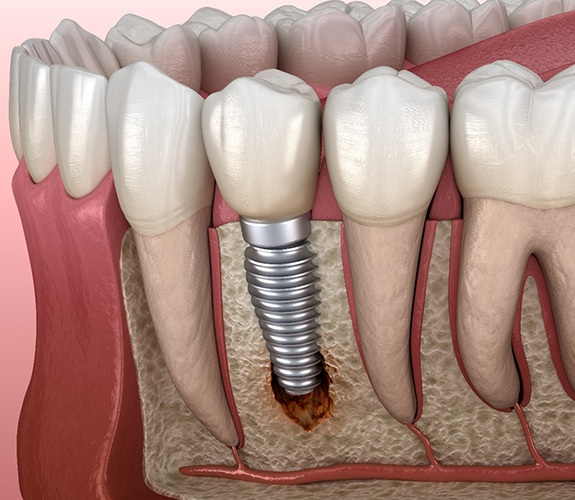
Dental Implant Failure & Salvage – Naperville, IL
Saving Your Smile When Trouble Occurs
Grand Dental – Naperville is pleased to provide patients with in-house dental implant placement and restoration. With trusted professionals to complete the work and create beautiful, long-lasting smiles, it is extremely rare that anyone would face complications after surgery. However, even with a 95% success rate, issues can arise if certain precautions are not taken. Fortunately, our team can provide various techniques and solutions should you face a failed dental implant in Naperville. To learn more about how we can save your smile from further harm, call us today.
Why Do Dental Implants Fail?

The average success rate for dental implant placement is around 95%. Only a small number will ever face serious complications related to their new teeth; however, when this happens, it is likely that one of the following is to blame:
- Peri-implantitis (similar to gum disease)
- Autoimmune disorders, diabetes, or another similar health condition
- Improper placement of implant posts
- Facial trauma
- Failed osseointegration
The most common reason for dental implant failure tends to be peri-implantitis. Occurring as a result of poor oral hygiene, this problem can lead to bone deterioration and implant failure, resulting in significant dental work to improve the situation.
Symptoms of Failed Dental Implants

If you’re unsure how to tell whether one of your dental implants has failed, you’re not alone. Many patients who require immediate dental care often assume the problem they’re facing is the result of something else. However, you’ll be more apt to tell if your dental implant is failing if you suffer from any of the following:
- A loose dental implant
- Pus appearing on the gums near the dental implant
- Difficulty eating
- Swelling or bleeding near the dental implant
- Discomfort that doesn’t go away after your implant surgery
How Dental Implant Salvage Works

To ensure that your smile lasts years or decades in the future, you’ll need to inquire about treatment the moment you notice a problem.
Should your implant dentist discover that the problem is peri-implantitis, you’ll need to undergo thorough deep cleaning before adding grafting materials to the existing bone so that they will integrate and form a solid base for your smile. While this may be done without having to remove the implant post, that cannot be determined until your dentist examines the severity of the infection.
Other potential problems like failed osseointegration, improper placement, or facial trauma will require that the post be removed before treating the area and allowing it to fully heal. Once this tissue is no longer experiencing pain or problems, we can discuss replacing your implant with a new one so that your smile will once again be back on track.